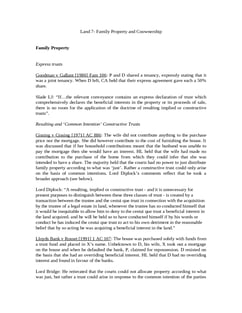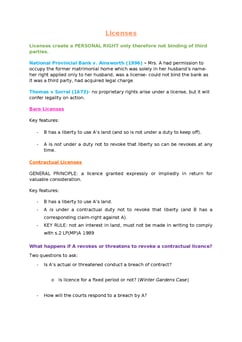National Provincial Bank Ltd v Ainsworth [1965] AC 1175
Judgement for the case National Provincial Bank Ltd v Ainsworth
KEY POINTS
The husband is not legally obligated to provide the wife with a specific house, and she doesn't have a legal entitlement to stay in any particular house. Her rights related to occupying her husband's property are primarily personal in nature.
Prior to being accepted into the category of property or a right affecting property, a right or interest must be able to be defined, identified by third parties, capable of being assumed by third parties by virtue of its nature, and have some degree of permanence or stability. These characteristics do not exist in the wife's right.
FACTS
The respondent, a married woman, was deserted by her husband, after which she continued to live in their house with her children. The husband had been registered as the owner of the property. In 1961, the Respondent obtained a decree of judicial separation and was granted alimony and maintenance for her children. The house was initially charged by the husband to the Appellant bank in 1958.
In November 1959, the husband conveyed both the house and another property to a company called Hastings Car Mart, Ltd., which then charged both properties to the Appellant. The company used the Appellant's funds to discharge the husband's debt. The company was registered as the new owner of the house. In 1961, the Appellant demanded repayment of the debt from the company, but the company did not comply.
Given that the property is registered land, the main question in this appeal to the House of Lords is whether the Respondent has an overriding interest in it under section 70(1)(g) of the Land Registration Act of 1925.
JUDGEMENT
Appeal allowed.
COMMENTARY
This decision is noteworthy for defining equitable interests in land and outlining the restrictions on a spouse's ability to live in a property that belongs to their partner.
It was determined that these rights are mostly of a personal nature and do not represent precise legal entitlements to a given piece of property.
ORIGINAL ANALYSIS
X had left his wife, Defendant, living in a matrimonial home after he left her and then mortgaged it out to Plaintiff, who made no investigation of any possible interests over the property, nor was aware that X had left Defendant.
HL found Defendant had no interest in the property (and hence Plaintiff’s failure to investigate was irrelevant) since the rights of a deserted wife were personal, not proprietary ones (i.e. they run with the person, not with the land).
The “actual occupation” clause therefore did not apply.
Lord Hodson
The LRA is concerned with rights that are capable of surviving through different ownerships of land, which the right of a deserted wife clearly is not.
On a separate point, he casts doubt on whether a deserted wife or her husband is considered “in actual occupation, but doesn’t answer this”.
Lord Wilberforce
The example of deserted wives shows how the present rules can cause injustice.
Makes point that deserted wives’ rights are personal and not proprietary. LRA 1925 is concerned only with latter.
For Further Study on National Provincial Bank Ltd v Ainsworth

Land Law notes fully updated for recent exams at Oxford and Cambridge. ...
Need instant answers? Our AI exam tutor is here to help.
Ask questions 🙋 Get answers 📔 It's simple 👁️👄👁️
Our AI is educated by the highest scoring students across all subjects and schools. Join hundreds of your peers today.
Get StartedSimilar Cases
Related Product Samples
These product samples contain the same concepts we cover in this case.
| Land Law | Leases Notes (77 pages) |
| Property Law | Legal Estates And Legal Interests In Land Notes (15 pages) |
| Land Law | Registration Theory Notes (39 pages) |

 Since 2010, Oxbridge Notes has been a trusted education marketplace, supplying high-quality materials from top achievers at universities like Oxford, Cambridge, LSE, Harvard, and Yale.
Since 2010, Oxbridge Notes has been a trusted education marketplace, supplying high-quality materials from top achievers at universities like Oxford, Cambridge, LSE, Harvard, and Yale.